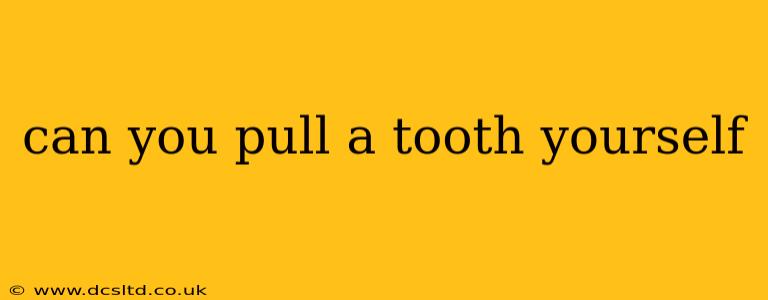Can You Pull a Tooth Yourself? A Risky Proposition
The short answer is: no, you should absolutely not attempt to pull your own tooth. While the internet is rife with DIY dental extraction videos, attempting this at home is incredibly dangerous and can lead to serious complications. This article will explore why you shouldn't try it, and what you should do instead.
What are the risks of pulling a tooth yourself?
Attempting a DIY tooth extraction carries significant risks, far outweighing any perceived benefits. These include:
- Infection: The mouth is teeming with bacteria. A poorly executed extraction can introduce these bacteria into the bloodstream, leading to serious infections like osteomyelitis (bone infection) or cellulitis (infection of the soft tissues).
- Excessive Bleeding: Pulling a tooth can cause significant bleeding, and uncontrolled bleeding can be dangerous, especially for individuals with clotting disorders.
- Dry Socket: This painful condition occurs when the blood clot that forms in the extraction site is dislodged, exposing the underlying bone and nerve endings. Improper extraction greatly increases the risk of dry socket.
- Damage to Adjacent Teeth: Improper technique can damage neighboring teeth, requiring further and more extensive dental work.
- Jaw Fracture: In some cases, particularly with stubborn or deeply rooted teeth, forceful attempts at extraction can fracture the jawbone.
- Nerve Damage: The nerves in your jaw are very close to your teeth. Damaging them during a self-extraction can lead to numbness, tingling, or persistent pain.
What happens if I try to pull a loose tooth myself?
Even a seemingly loose tooth shouldn't be pulled at home. While a slightly wobbly tooth might seem easy to remove, improper technique can still lead to the complications listed above. A dentist has the tools and expertise to remove the tooth safely and efficiently, minimizing the risk of complications.
When should I see a dentist for tooth extraction?
You should schedule an appointment with a dentist if you experience:
- Severe toothache: Pain that doesn't respond to over-the-counter pain relievers.
- Loose tooth: A tooth that is significantly loose or wobbly.
- Broken or chipped tooth: A tooth that has broken or chipped, exposing the nerve.
- Swollen gums: Swollen or inflamed gums around a tooth.
- Persistent bad breath: Bad breath that doesn't improve with brushing and flossing.
Is there a safe way to remove a tooth at home?
No, there is no safe way to remove a tooth at home. The procedures and tools used by dentists are designed to minimize risk and ensure a clean, precise extraction. Trying to replicate this at home is incredibly risky and should be avoided.
What are the alternatives to pulling a tooth yourself?
The best alternative is to see a dentist. They can assess the situation, determine the best course of action, and perform the extraction safely and effectively. In some cases, a dentist might be able to save the tooth with root canal treatment or other restorative procedures. Never attempt a home remedy for tooth extraction.
How much does it cost to have a tooth pulled by a dentist?
The cost of a tooth extraction varies greatly depending on several factors, including the location, the dentist's fees, the complexity of the extraction, and whether insurance covers any of the procedure. It's best to contact your dentist or insurance provider for an accurate estimate.
In conclusion, while the temptation to pull a troublesome tooth yourself might be strong, the risks are far too great. Always consult a dentist for any tooth-related problems. Your oral health and overall well-being are worth the investment in professional care.
